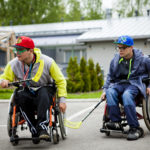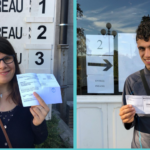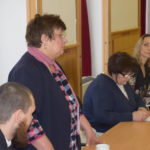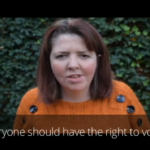[:de]
[:en]
Click here for the easy-to-read version
Searching for information, reading the news, using social media to stay in touch with friends: More and more people with intellectual disabilities surf the internet and enjoy being included online. Most of the time, they do so without any incidents. There is however the risk for people using the Internet to become victims of cybercrime.
The project “Be.Safe”, financed by the Erasmus+ Adult Education Programme, aims to address this risk: The initiative, launched by a number of European partners including Inclusion Europe, will develop curricula for training courses
- for teachers in adult education: to enable them to mainstream information about cyber violence into their educational programmes and
- for persons with intellectual disability: to empower them to stay safe online.
Two 5-day courses will be conducted – one in Portugal, one in Poland.
Additionally, a digital guide for police will be created that can help with communication with a person with an intellectual disability, for example if he or she wants to press charges.
The project will be carried out by a partnership led by Inclusion Europe’s member PSONI (Poland). Other partners include Inclusion Europe’s member Inclusion Czech Republic, the Polytechnic Institute of Santarém (Portugal) and the Regional Centre for Persons with Intellectual Disability PORAKA NASA (Former Yugoslav Republic of Macedonia).
As a first step, the project partners will collect case studies gathering real-life examples of situations in which persons with intellectual disabilities became victims of cyber violence. These will be the basis for the development of the curricula and training materials.
Easy-to-read version
Click on a word which is in bold to read what it means.

Lots of people with intellectual disabilities
like to use the internet.
The internet is good for looking for information,
reading about the news, and using websites
like Facebook to stay in touch with friends.
Most of the time it is very safe to use the internet
and people do not have a problem.
Sometimes people can be victims of crime when they use the internet.
We call this cybercrime.
An example of cybercrime is when someone on the internet
pretends to be someone they are not.
They then might try to get money from people.
To help stop cybercrime
against people with intellectual disabilities
there is a project called Be Safe.
Be Safe is being paid for by the European Commission.
Inclusion Europe is part of the project.
Inclusion Europe and the other project partners
will help make training courses.
These training courses are for teachers in adult education
and also for people with intellectual disabilities.
The training courses for the teachers in adult education will help them
to be able to include information about cybercrime
into their programmes.
The training courses for the people with intellectual disabilities
will help to empower them and help them to stay safe
when they are using the internet.
There will be 2 five-day courses.
One course will be held in Portugal.
The other course will be held in Poland.
Also the project will make an online guide for police.
The guide will help police to talk to people with intellectual disabilities
who come to them because of a cybercrime.
The Be Safe project is being led
by PSONI.
PSONI is Inclusion Europe’s member from Poland.
Another project partner is Inclusion Europe’s member
Inclusion Czech Republic.
Other project partners are the
Polytechnic Institute of Santarém and PORAKA NASA.
The Polytechnic Institute of Santarém is a university in Portugal.
PORAKA NASA is the regional centre for persons
with intellectual disabilities in the Former Yugoslav Republic
of Macedonia.
As the first step of the project the partners will get more information
about people with intellectual disabilities
who have been victims of cybercrime.
The partners will then use the information
to help make the training courses.[:fi]Searching for information, reading the news, using social media to stay in touch with friends: More and more people with intellectual disabilities surf the internet and enjoy being included online. Most of the time, they do so without any incidents. There is however the risk for people using the Internet to become victims of cybercrime.
The project “Be.Safe”, financed by the Erasmus+ Adult Education Programme, aims to address this risk: The initiative, launched by a number of European partners including Inclusion Europe, will develop curricula for training courses
- for teachers in adult education: to enable them to mainstream information about cyber violence into their educational programmes and
- for persons with intellectual disability: to empower them to stay safe online.
Two 5-day courses will be conducted – one in Portugal, one in Poland.
Additionally, a digital guide for police will be created that can help with communication with a person with an intellectual disability, for example if he or she wants to press charges.
The project will be carried out by a partnership lead by Inclusion Europe’s member PSONI (Poland). Other partners include Inclusion Europe’s member Inclusion Czech Republic, the Polytechnic Institute of Santarém (Portugal) and the Regional Centre for Persons with Intellectual Disability PORAKA NASA (Former Yugoslav Republic of Macedonia).
As a first step, the project partners will collect case studies gathering real-life examples of situations in which persons with intellectual disabilities became victims of cyber violence. These will be the basis for the development of the curricula and training materials.
[:fr]
Cliquez ici pour la version facile à lire
Rechercher de l’information, lire les nouvelles, utiliser les médias sociaux pour rester en contact avec des amis: De plus en plus de personnes avec un handicap intellectuel surfent sur Internet et aiment être incluses en ligne. La plupart du temps, elles le font sans aucun problème. Il existe toutefois un risque que les personnes utilisant Internet soient victimes de la cybercriminalité.
Le projet « Be.Safe », financé par le programme Erasmus+ pour l’Éducation des adultes, vise à prévenir ce risque: L’initiative, lancée par un certain nombre de partenaires européens dont Inclusion Europe, développera des curricula pour des cours de formation
- pour les enseignants des adultes: leur permettre d’inclure des informations sur la cyber violence dans leurs programmes éducatifs et
- pour les personnes avec un handicap intellectuel: pour leur permettre de rester en sécurité en ligne.
Deux cours de 5 jours seront organisés: un au Portugal et un en Pologne.
De plus, un guide numérique pour la police sera créé pour faciliter la communication avec une personne avec un handicap intellectuel, par exemple, si elle veut porter plainte.
Le projet sera réalisé par un partenariat dirigé par PSONI (Pologne), membre d’Inclusion Europe. Parmi les autres partenaires se trouvent nos membres Inclusion Czech Republic, l’Institut polytechnique de Santarém (Portugal) et le Centre régional pour personnes handicapées mentales PORAKA NASA (Ancienne République Yougoslave de Macédoine).
Dans un premier temps, les partenaires du projet collecteront des études de cas rassemblant des exemples concrets de situations dans lesquelles des personnes avec un handicap intellectuel sont devenues victimes de cyber-violence. Celles-ci serviront de base au développement des programmes d’études et de ressources de formation.
Version facile à lire
Cliquez sur un mot qui est en gras pour lire ce que cela signifie.

Beaucoup de personnes avec un handicap intellectuel
aiment utiliser Internet.
Internet est utile pour rechercher des informations,
lire des nouvelles, et pour utilier des sites web comme Facebook
pour rester en contact avec des amis.
La plupart du temps, il est très facile d’utiliser Internet en toute sécurité
et les gens n’ont pas de problème.
Parfois, les gens peuvent être victimes d’agression lorsqu’ils utilisent Internet.
Nous appelons cela la cybercriminalité.
Un exemple de cybercriminalité est quand quelqu’un sur Internet
prétend être quelqu’un qu’il n‘est pas.
Il pourrait alors essayer d’obtenir de l’argent des gens.
Pour aider à arrêter la cybercriminalité
contre les personnes avec un handicap intellectuel
il y a un projet appelé Be Safe.
Be Safe est financé par la Commission européenne.
Inclusion Europe fait partie du projet.
Inclusion Europe et les autres partenaires du projet
feront des cours de formation.
Ces cours de formation s’adressent aux enseignants
et aussi aux personnes avec un handicap intellectuel.
Les cours de formation pour les enseignants leur permettront
d’inclure des informations sur la cybercriminalité
dans leurs programmes.
Les cours de formation pour les personnes avec un handicap intellectuel
les aideront à rester en sécurité
quand ils surfent sur Internet.
Il y aura deux cours de cinq jours.
Un cours aura lieu au Portugal.
L’autre cours aura lieu en Pologne.
Le projet fera également un guide en ligne pour la police.
Le guide aidera la police à parler aux personnes avec un handicap intellectuel
qui ont été victimes d’un cybercrime.
Le projet Be Safe est mené par PSONI.
PSONI est membre d’Inclusion Europe de Pologne.
Un autre partenaire du projet est le membre d’Inclusion Europe
Inclusion République Tchèque.
Les autres partenaires du projet sont l‘Institut Polytechnique de Santarém et PORAKA NASA.
L’Institut Polytechnique de Santarém est une université au Portugal.
PORAKA NASA est le centre régional pour les personnes avec un handicap intellectuel
dans l‘Ancienne République Yougoslave de Macédoine.
Comme première étape du projet, les partenaires vont rechercher plus d’informations
à propos des personnes avec un handicap intellectuel
qui ont été victimes de la cybercriminalité.
Les partenaires utiliseront ensuite l’information
pour aider à faire les cours de formation.[:nl]Searching for information, reading the news, using social media to stay in touch with friends: More and more people with intellectual disabilities surf the internet and enjoy being included online. Most of the time, they do so without any incidents. There is however the risk for people using the Internet to become victims of cybercrime.
The project “Be.Safe”, financed by the Erasmus+ Adult Education Programme, aims to address this risk: The initiative, launched by a number of European partners including Inclusion Europe, will develop curricula for training courses
- for teachers in adult education: to enable them to mainstream information about cyber violence into their educational programmes and
- for persons with intellectual disability: to empower them to stay safe online.
Two 5-day courses will be conducted – one in Portugal, one in Poland.
Additionally, a digital guide for police will be created that can help with communication with a person with an intellectual disability, for example if he or she wants to press charges.
The project will be carried out by a partnership lead by Inclusion Europe’s member PSONI (Poland). Other partners include Inclusion Europe’s member Inclusion Czech Republic, the Polytechnic Institute of Santarém (Portugal) and the Regional Centre for Persons with Intellectual Disability PORAKA NASA (Former Yugoslav Republic of Macedonia).
As a first step, the project partners will collect case studies gathering real-life examples of situations in which persons with intellectual disabilities became victims of cyber violence. These will be the basis for the development of the curricula and training materials.
[:sv]Searching for information, reading the news, using social media to stay in touch with friends: More and more people with intellectual disabilities surf the internet and enjoy being included online. Most of the time, they do so without any incidents. There is however the risk for people using the Internet to become victims of cybercrime.
The project “Be.Safe”, financed by the Erasmus+ Adult Education Programme, aims to address this risk: The initiative, launched by a number of European partners including Inclusion Europe, will develop curricula for training courses
- for teachers in adult education: to enable them to mainstream information about cyber violence into their educational programmes and
- for persons with intellectual disability: to empower them to stay safe online.
Two 5-day courses will be conducted – one in Portugal, one in Poland.
Additionally, a digital guide for police will be created that can help with communication with a person with an intellectual disability, for example if he or she wants to press charges.
The project will be carried out by a partnership lead by Inclusion Europe’s member PSONI (Poland). Other partners include Inclusion Europe’s member Inclusion Czech Republic, the Polytechnic Institute of Santarém (Portugal) and the Regional Centre for Persons with Intellectual Disability PORAKA NASA (Former Yugoslav Republic of Macedonia).
As a first step, the project partners will collect case studies gathering real-life examples of situations in which persons with intellectual disabilities became victims of cyber violence. These will be the basis for the development of the curricula and training materials.
[:it]Searching for information, reading the news, using social media to stay in touch with friends: More and more people with intellectual disabilities surf the internet and enjoy being included online. Most of the time, they do so without any incidents. There is however the risk for people using the Internet to become victims of cybercrime.
The project “Be.Safe”, financed by the Erasmus+ Adult Education Programme, aims to address this risk: The initiative, launched by a number of European partners including Inclusion Europe, will develop curricula for training courses
- for teachers in adult education: to enable them to mainstream information about cyber violence into their educational programmes and
- for persons with intellectual disability: to empower them to stay safe online.
Two 5-day courses will be conducted – one in Portugal, one in Poland.
Additionally, a digital guide for police will be created that can help with communication with a person with an intellectual disability, for example if he or she wants to press charges.
The project will be carried out by a partnership lead by Inclusion Europe’s member PSONI (Poland). Other partners include Inclusion Europe’s member Inclusion Czech Republic, the Polytechnic Institute of Santarém (Portugal) and the Regional Centre for Persons with Intellectual Disability PORAKA NASA (Former Yugoslav Republic of Macedonia).
As a first step, the project partners will collect case studies gathering real-life examples of situations in which persons with intellectual disabilities became victims of cyber violence. These will be the basis for the development of the curricula and training materials.
[:sl]Searching for information, reading the news, using social media to stay in touch with friends: More and more people with intellectual disabilities surf the internet and enjoy being included online. Most of the time, they do so without any incidents. There is however the risk for people using the Internet to become victims of cybercrime.
The project “Be.Safe”, financed by the Erasmus+ Adult Education Programme, aims to address this risk: The initiative, launched by a number of European partners including Inclusion Europe, will develop curricula for training courses
- for teachers in adult education: to enable them to mainstream information about cyber violence into their educational programmes and
- for persons with intellectual disability: to empower them to stay safe online.
Two 5-day courses will be conducted – one in Portugal, one in Poland.
Additionally, a digital guide for police will be created that can help with communication with a person with an intellectual disability, for example if he or she wants to press charges.
The project will be carried out by a partnership lead by Inclusion Europe’s member PSONI (Poland). Other partners include Inclusion Europe’s member Inclusion Czech Republic, the Polytechnic Institute of Santarém (Portugal) and the Regional Centre for Persons with Intellectual Disability PORAKA NASA (Former Yugoslav Republic of Macedonia).
As a first step, the project partners will collect case studies gathering real-life examples of situations in which persons with intellectual disabilities became victims of cyber violence. These will be the basis for the development of the curricula and training materials.
[:ro]Searching for information, reading the news, using social media to stay in touch with friends: More and more people with intellectual disabilities surf the internet and enjoy being included online. Most of the time, they do so without any incidents. There is however the risk for people using the Internet to become victims of cybercrime.
The project “Be.Safe”, financed by the Erasmus+ Adult Education Programme, aims to address this risk: The initiative, launched by a number of European partners including Inclusion Europe, will develop curricula for training courses
- for teachers in adult education: to enable them to mainstream information about cyber violence into their educational programmes and
- for persons with intellectual disability: to empower them to stay safe online.
Two 5-day courses will be conducted – one in Portugal, one in Poland.
Additionally, a digital guide for police will be created that can help with communication with a person with an intellectual disability, for example if he or she wants to press charges.
The project will be carried out by a partnership lead by Inclusion Europe’s member PSONI (Poland). Other partners include Inclusion Europe’s member Inclusion Czech Republic, the Polytechnic Institute of Santarém (Portugal) and the Regional Centre for Persons with Intellectual Disability PORAKA NASA (Former Yugoslav Republic of Macedonia).
As a first step, the project partners will collect case studies gathering real-life examples of situations in which persons with intellectual disabilities became victims of cyber violence. These will be the basis for the development of the curricula and training materials.
[:hu]Searching for information, reading the news, using social media to stay in touch with friends: More and more people with intellectual disabilities surf the internet and enjoy being included online. Most of the time, they do so without any incidents. There is however the risk for people using the Internet to become victims of cybercrime.
The project “Be.Safe”, financed by the Erasmus+ Adult Education Programme, aims to address this risk: The initiative, launched by a number of European partners including Inclusion Europe, will develop curricula for training courses
- for teachers in adult education: to enable them to mainstream information about cyber violence into their educational programmes and
- for persons with intellectual disability: to empower them to stay safe online.
Two 5-day courses will be conducted – one in Portugal, one in Poland.
Additionally, a digital guide for police will be created that can help with communication with a person with an intellectual disability, for example if he or she wants to press charges.
The project will be carried out by a partnership lead by Inclusion Europe’s member PSONI (Poland). Other partners include Inclusion Europe’s member Inclusion Czech Republic, the Polytechnic Institute of Santarém (Portugal) and the Regional Centre for Persons with Intellectual Disability PORAKA NASA (Former Yugoslav Republic of Macedonia).
As a first step, the project partners will collect case studies gathering real-life examples of situations in which persons with intellectual disabilities became victims of cyber violence. These will be the basis for the development of the curricula and training materials.
[:es]Searching for information, reading the news, using social media to stay in touch with friends: More and more people with intellectual disabilities surf the internet and enjoy being included online. Most of the time, they do so without any incidents. There is however the risk for people using the Internet to become victims of cybercrime.
The project “Be.Safe”, financed by the Erasmus+ Adult Education Programme, aims to address this risk: The initiative, launched by a number of European partners including Inclusion Europe, will develop curricula for training courses
- for teachers in adult education: to enable them to mainstream information about cyber violence into their educational programmes and
- for persons with intellectual disability: to empower them to stay safe online.
Two 5-day courses will be conducted – one in Portugal, one in Poland.
Additionally, a digital guide for police will be created that can help with communication with a person with an intellectual disability, for example if he or she wants to press charges.
The project will be carried out by a partnership lead by Inclusion Europe’s member PSONI (Poland). Other partners include Inclusion Europe’s member Inclusion Czech Republic, the Polytechnic Institute of Santarém (Portugal) and the Regional Centre for Persons with Intellectual Disability PORAKA NASA (Former Yugoslav Republic of Macedonia).
As a first step, the project partners will collect case studies gathering real-life examples of situations in which persons with intellectual disabilities became victims of cyber violence. These will be the basis for the development of the curricula and training materials.
[:pt]Searching for information, reading the news, using social media to stay in touch with friends: More and more people with intellectual disabilities surf the internet and enjoy being included online. Most of the time, they do so without any incidents. There is however the risk for people using the Internet to become victims of cybercrime.
The project “Be.Safe”, financed by the Erasmus+ Adult Education Programme, aims to address this risk: The initiative, launched by a number of European partners including Inclusion Europe, will develop curricula for training courses
- for teachers in adult education: to enable them to mainstream information about cyber violence into their educational programmes and
- for persons with intellectual disability: to empower them to stay safe online.
Two 5-day courses will be conducted – one in Portugal, one in Poland.
Additionally, a digital guide for police will be created that can help with communication with a person with an intellectual disability, for example if he or she wants to press charges.
The project will be carried out by a partnership lead by Inclusion Europe’s member PSONI (Poland). Other partners include Inclusion Europe’s member Inclusion Czech Republic, the Polytechnic Institute of Santarém (Portugal) and the Regional Centre for Persons with Intellectual Disability PORAKA NASA (Former Yugoslav Republic of Macedonia).
As a first step, the project partners will collect case studies gathering real-life examples of situations in which persons with intellectual disabilities became victims of cyber violence. These will be the basis for the development of the curricula and training materials.
[:pl]Searching for information, reading the news, using social media to stay in touch with friends: More and more people with intellectual disabilities surf the internet and enjoy being included online. Most of the time, they do so without any incidents. There is however the risk for people using the Internet to become victims of cybercrime.
The project “Be.Safe”, financed by the Erasmus+ Adult Education Programme, aims to address this risk: The initiative, launched by a number of European partners including Inclusion Europe, will develop curricula for training courses
- for teachers in adult education: to enable them to mainstream information about cyber violence into their educational programmes and
- for persons with intellectual disability: to empower them to stay safe online.
Two 5-day courses will be conducted – one in Portugal, one in Poland.
Additionally, a digital guide for police will be created that can help with communication with a person with an intellectual disability, for example if he or she wants to press charges.
The project will be carried out by a partnership lead by Inclusion Europe’s member PSONI (Poland). Other partners include Inclusion Europe’s member Inclusion Czech Republic, the Polytechnic Institute of Santarém (Portugal) and the Regional Centre for Persons with Intellectual Disability PORAKA NASA (Former Yugoslav Republic of Macedonia).
As a first step, the project partners will collect case studies gathering real-life examples of situations in which persons with intellectual disabilities became victims of cyber violence. These will be the basis for the development of the curricula and training materials.
[:hr]Searching for information, reading the news, using social media to stay in touch with friends: More and more people with intellectual disabilities surf the internet and enjoy being included online. Most of the time, they do so without any incidents. There is however the risk for people using the Internet to become victims of cybercrime.
The project “Be.Safe”, financed by the Erasmus+ Adult Education Programme, aims to address this risk: The initiative, launched by a number of European partners including Inclusion Europe, will develop curricula for training courses
- for teachers in adult education: to enable them to mainstream information about cyber violence into their educational programmes and
- for persons with intellectual disability: to empower them to stay safe online.
Two 5-day courses will be conducted – one in Portugal, one in Poland.
Additionally, a digital guide for police will be created that can help with communication with a person with an intellectual disability, for example if he or she wants to press charges.
The project will be carried out by a partnership lead by Inclusion Europe’s member PSONI (Poland). Other partners include Inclusion Europe’s member Inclusion Czech Republic, the Polytechnic Institute of Santarém (Portugal) and the Regional Centre for Persons with Intellectual Disability PORAKA NASA (Former Yugoslav Republic of Macedonia).
As a first step, the project partners will collect case studies gathering real-life examples of situations in which persons with intellectual disabilities became victims of cyber violence. These will be the basis for the development of the curricula and training materials.
[:tr]Searching for information, reading the news, using social media to stay in touch with friends: More and more people with intellectual disabilities surf the internet and enjoy being included online. Most of the time, they do so without any incidents. There is however the risk for people using the Internet to become victims of cybercrime.
The project “Be.Safe”, financed by the Erasmus+ Adult Education Programme, aims to address this risk: The initiative, launched by a number of European partners including Inclusion Europe, will develop curricula for training courses
- for teachers in adult education: to enable them to mainstream information about cyber violence into their educational programmes and
- for persons with intellectual disability: to empower them to stay safe online.
Two 5-day courses will be conducted – one in Portugal, one in Poland.
Additionally, a digital guide for police will be created that can help with communication with a person with an intellectual disability, for example if he or she wants to press charges.
The project will be carried out by a partnership lead by Inclusion Europe’s member PSONI (Poland). Other partners include Inclusion Europe’s member Inclusion Czech Republic, the Polytechnic Institute of Santarém (Portugal) and the Regional Centre for Persons with Intellectual Disability PORAKA NASA (Former Yugoslav Republic of Macedonia).
As a first step, the project partners will collect case studies gathering real-life examples of situations in which persons with intellectual disabilities became victims of cyber violence. These will be the basis for the development of the curricula and training materials.
[:et]Searching for information, reading the news, using social media to stay in touch with friends: More and more people with intellectual disabilities surf the internet and enjoy being included online. Most of the time, they do so without any incidents. There is however the risk for people using the Internet to become victims of cybercrime.
The project “Be.Safe”, financed by the Erasmus+ Adult Education Programme, aims to address this risk: The initiative, launched by a number of European partners including Inclusion Europe, will develop curricula for training courses
- for teachers in adult education: to enable them to mainstream information about cyber violence into their educational programmes and
- for persons with intellectual disability: to empower them to stay safe online.
Two 5-day courses will be conducted – one in Portugal, one in Poland.
Additionally, a digital guide for police will be created that can help with communication with a person with an intellectual disability, for example if he or she wants to press charges.
The project will be carried out by a partnership lead by Inclusion Europe’s member PSONI (Poland). Other partners include Inclusion Europe’s member Inclusion Czech Republic, the Polytechnic Institute of Santarém (Portugal) and the Regional Centre for Persons with Intellectual Disability PORAKA NASA (Former Yugoslav Republic of Macedonia).
As a first step, the project partners will collect case studies gathering real-life examples of situations in which persons with intellectual disabilities became victims of cyber violence. These will be the basis for the development of the curricula and training materials.
[:el]Searching for information, reading the news, using social media to stay in touch with friends: More and more people with intellectual disabilities surf the internet and enjoy being included online. Most of the time, they do so without any incidents. There is however the risk for people using the Internet to become victims of cybercrime.
The project “Be.Safe”, financed by the Erasmus+ Adult Education Programme, aims to address this risk: The initiative, launched by a number of European partners including Inclusion Europe, will develop curricula for training courses
- for teachers in adult education: to enable them to mainstream information about cyber violence into their educational programmes and
- for persons with intellectual disability: to empower them to stay safe online.
Two 5-day courses will be conducted – one in Portugal, one in Poland.
Additionally, a digital guide for police will be created that can help with communication with a person with an intellectual disability, for example if he or she wants to press charges.
The project will be carried out by a partnership lead by Inclusion Europe’s member PSONI (Poland). Other partners include Inclusion Europe’s member Inclusion Czech Republic, the Polytechnic Institute of Santarém (Portugal) and the Regional Centre for Persons with Intellectual Disability PORAKA NASA (Former Yugoslav Republic of Macedonia).
As a first step, the project partners will collect case studies gathering real-life examples of situations in which persons with intellectual disabilities became victims of cyber violence. These will be the basis for the development of the curricula and training materials.
[:]







